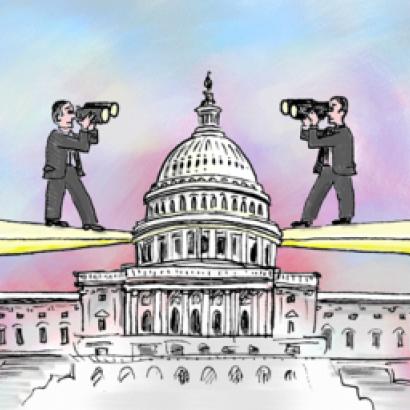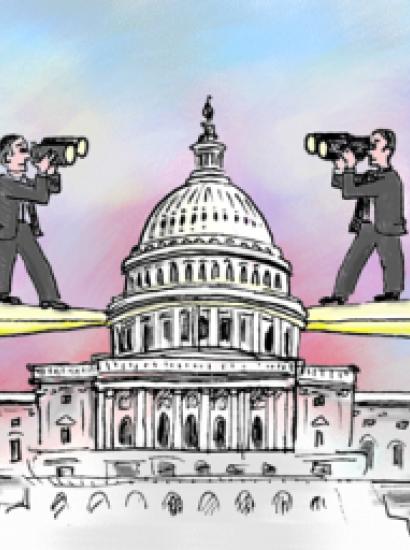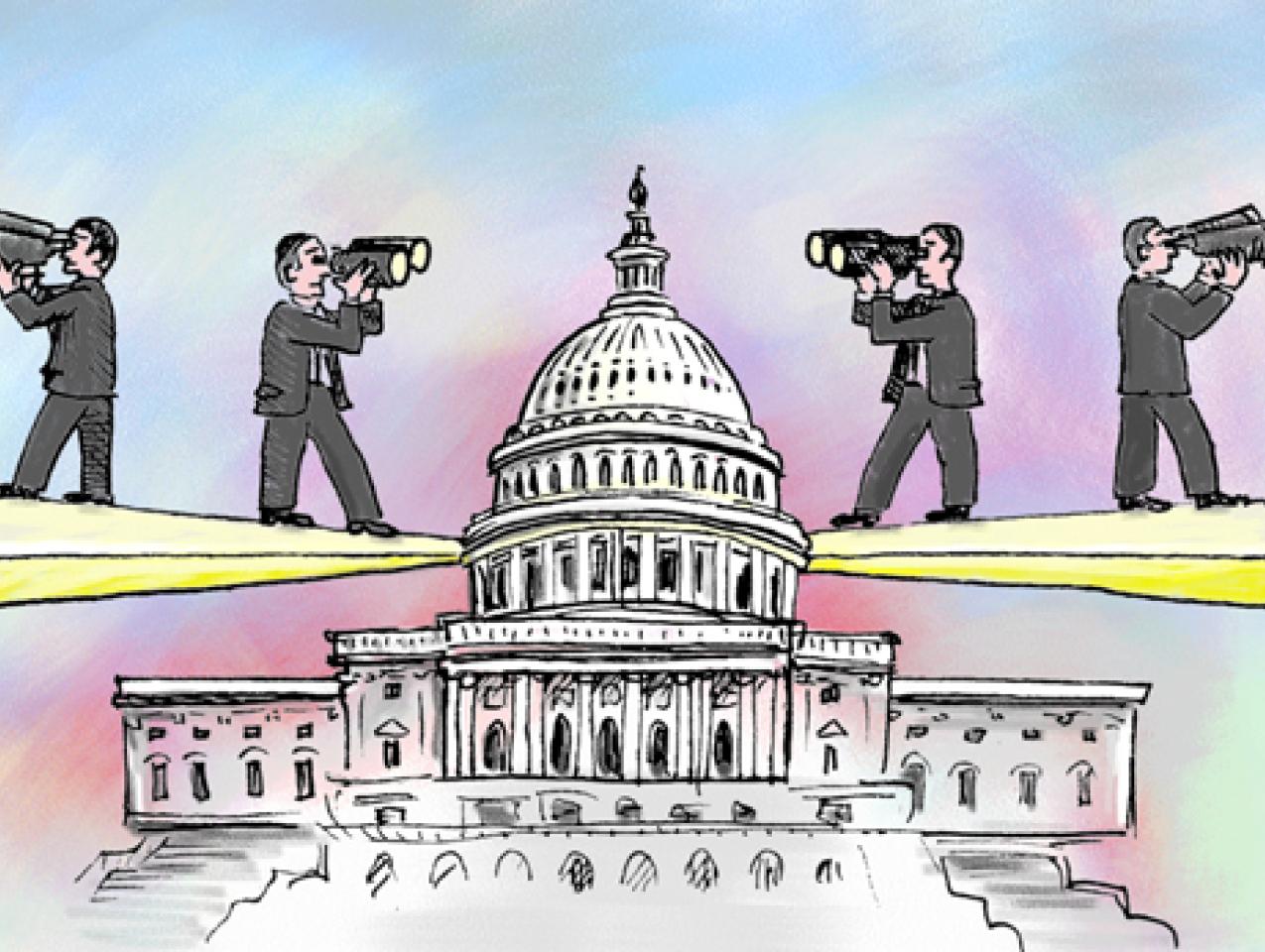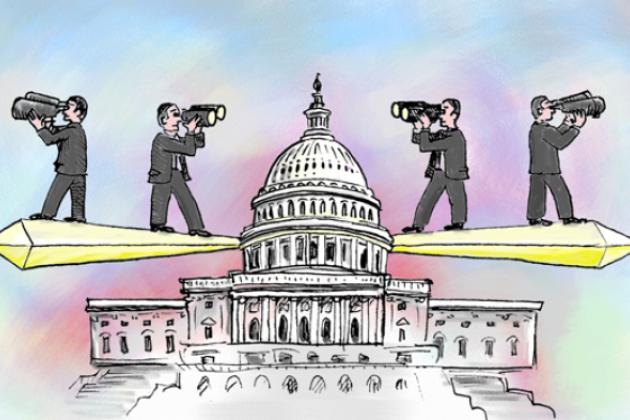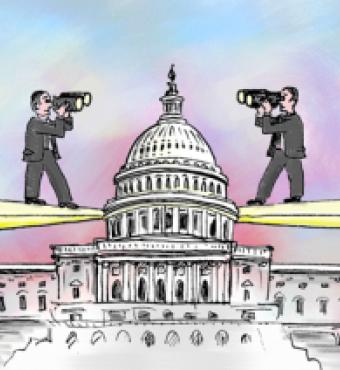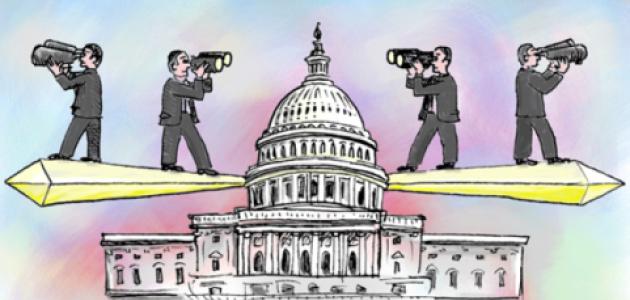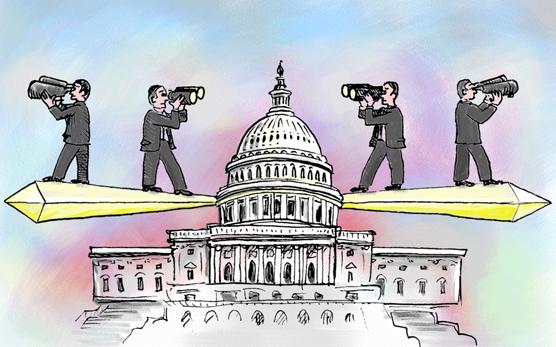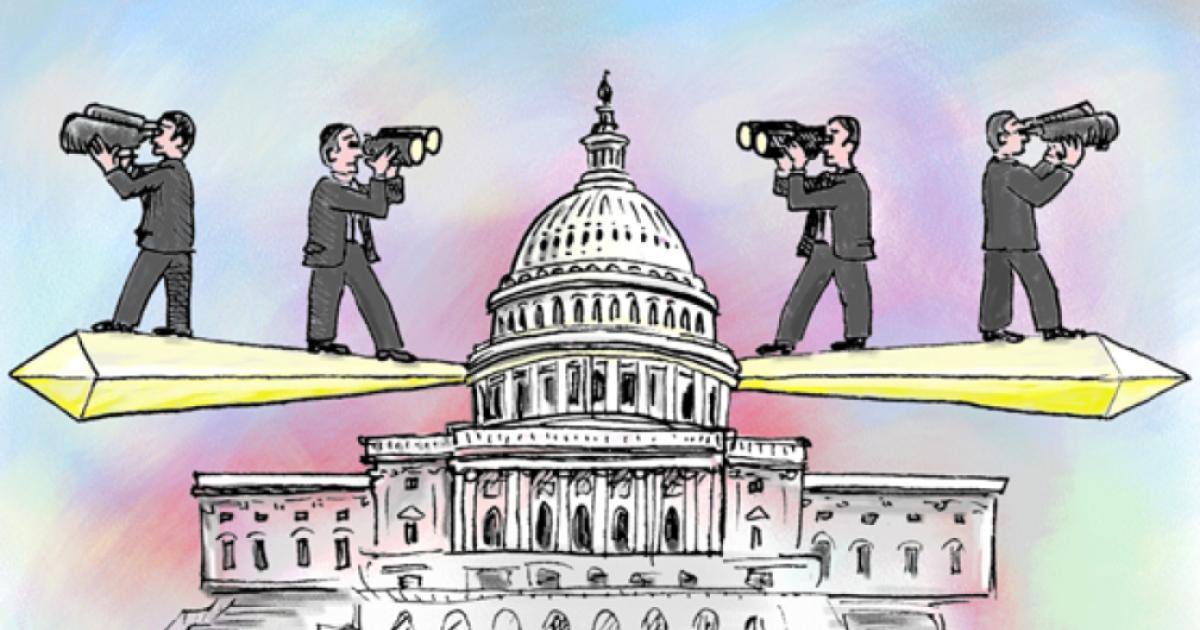- International Affairs
- US Foreign Policy
Ten years after 9/11, the least reformed part of America’s intelligence system is not the Central Intelligence Agency (CIA) or the Federal Bureau of Investigation (FBI), but the United States Congress. The September 11th terrorist attacks sparked major efforts to transform executive branch intelligence agencies. These include the creation of the Office of the Director of National Intelligence (ODNI), the most sweeping intelligence restructuring since the establishment of the CIA in 1947; the formation of the Department of Homeland Security (DHS), which combined twenty-two agencies and two-hundred thousand employees to provide "one face at the border;" dramatic initiatives to transform the FBI from a law enforcement to domestic intelligence agency; and the proliferation of more than seventy regional, state, and local terrorist fusion centers to integrate terrorist threat reporting across the country.
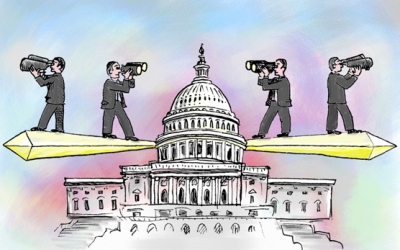
Illustration by Barbara Kelley
Although reforms have generated some major successes—including the May 2011 capture and killing of Osama bin Laden—not all intelligence improvement efforts have actually produced improvements, a topic that I have previously explored in Spying Blind: The CIA, the FBI, and the Origins of 9/11 (Princeton University Press, 2007). Some reforms have failed. Many have not gone far enough, fast enough. Others have proven counterproductive, creating more red tape and fatigue than results. Recent terrorist plots, including the 2009 Fort Hood shooting, the 2009 Christmas Day underwear bomber, and the May 2010 Times Square car bomb plot, remind us all too well that serious weaknesses in the American intelligence system remain.
Indeed, the confessed Times Square bomb "mastermind," Pakistani-American Faisal Shahzad, was too dumb or too poorly trained to construct a workable explosive or park his car bomb inconspicuously (he abandoned his Nissan Pathfinder with its engine running and hazard lights flashing, which immediately attracted the attention of nearby street vendors). Yet Shahzad still managed to outsmart his FBI surveillance team, losing them somewhere between Connecticut and John F. Kennedy International Airport in New York. And despite being placed on the "no-fly list," he was able to board a Dubai-bound flight and was just minutes from takeoff when Customs and Border Patrol agents realized he was on board and apprehended him. Shahzad later pleaded guilty to all ten terrorism-related charges against him.
Despite this record, it is clear that the seventeen agencies that comprise the United States Intelligence Community—the constellation of federal agencies tasked with collecting and analyzing intelligence—are expending considerable energy attempting to adapt to ever-changing terrorist threats. As one senior FBI official told me, "This is all I do, okay? 24/7, 365 days a year. I don’t have a wife. I don’t have kids. It’s all I think about." The same is true in the field. "The burn out rate in my Al Qaeda squad is terrible," noted one FBI agent in May 2010. "And these are agents who have done other CT [counterterrorism] work, where the pace is already tough. They’re just getting crushed by the load."
In the twenty-first century threat environment, intelligence has eclipsed military firepower as the nation’s most important line of defense.
Just above the doorway that leads to the CIA’s Counterterrorism Center hangs a sign that reads, "Today’s date is September 12, 2001." Spend any amount of time there, or in a military unit in Afghanistan, the New York Police Department, the Office of the Director of National Intelligence, or any of the other sixteen federal intelligence agencies charged with collecting and analyzing intelligence, and you will quickly realize just how many people are working feverishly to adapt to what they call, simply, "the mission."
Congress is another story. While Congress has been instrumental in many post-9/11 executive branch reforms, Congress has been largely unable to reform itself. In 2004, the 9/11 Commission called congressional oversight "dysfunctional," and warned that fixing oversight weaknesses would be both essential to American national security and exceedingly difficult to achieve. One year later, the Commission’s report card gave efforts to improve intelligence oversight a "D." That same year, a second blue-ribbon commission (chaired by Judge Laurence Silberman and former Senator Chuck Robb), which was tasked with examining what went wrong with estimates of Iraqi weapons of mass destruction (WMD), joined the call for oversight reform. That commission’s final report concluded that, "Many sound past proposals for intelligence reform have withered on the vine. Either the Intelligence Community is inherently resistant to outside recommendations, or it lacks the institutional capacity to implement them. In either case, sustained external oversight is necessary" (emphasis mine). Although many of the Silberman-Robb Commission’s executive branch reforms were adopted, its congressional reforms were not embraced.
By the fall of 2007, the Senate Select Committee on Intelligence grew so deeply concerned that it held a hearing on itself. I testified at that hearing, along with Lee Hamilton, who served as the 9/11 Commission’s vice chairman and earlier as chairman of the House Permanent Select Committee on Intelligence (HPSCI). Pointing his finger at all the senators around the room, Hamilton delivered an ominous warning:
To me, the strong point simply is that the Senate of the United States and the House of the United States is [sic] not doing its job. And because you're not doing the job, the country is not as safe as it ought to be . . . . You're dealing here with the national security of the United States, and the Senate and the House ought to have the deep down feeling that we've got to get this thing right.
Hamilton’s words prompted vigorous nods of agreement across the aisle, but never made headlines or produced major changes. Instead, the committee’s own oversight-reform centerpiece—consolidating appropriations and authorization powers—quickly and quietly died. In May 2009, House Speaker Nancy Pelosi declared in a press conference that oversight had become so feckless that the only way to change Bush administration intelligence policies was to oust Republicans at the polls. And in January 2010, eight years after 9/11, a third blue-ribbon commission—the Commission on the Prevention of Weapons of Mass Destruction Proliferation and Terrorism—concluded that congressional intelligence and homeland security reform efforts were still failing. Notably, nearly all of the proposed oversight changes required simply modifying internal congressional rules and committee jurisdictions, not passing new laws.
Why have such intelligence deficiencies persisted for so long, despite the clarion call for change after 9/11 and the unprecedented importance of intelligence in today’s threat environment? As many have noted, during the Cold War the Soviet adversary was easy to find but hard to kill, making military firepower the key to success. Today, the situation is reversed; our terrorist enemies are hard to find but easy to kill. It is now the weak that threaten the strong. Driven by fanaticism, hidden from view, and armed with internet connections and deadly weapons that can fit into a suitcase or vial, small bands of trans-national terrorists can wreak massive damage as never before. In the twenty-first century threat environment, intelligence has eclipsed military firepower as the nation’s most important line of defense.
The least reformed part of America’s intelligence system is not the CIA or the FBI, but the United States Congress.
Nowhere was the importance of intelligence more on display than in the May 1st operation to kill Osama bin Laden at his Pakistani hideout. Success did not require tanks, massive aerial bombardment, or invasion. The "boots on the ground" did not number in the hundreds of thousands, or even the hundreds. Instead, the operation to nab the world’s most dangerous terrorist came down to just two critical elements: a small, elite Navy SEAL team and actionable intelligence that had been painstakingly collected and analyzed over a period of years.
Intelligence agencies cannot go it alone. Legislative oversight, done well, ensures that the Intelligence Community gets the resources it needs and deploys those resources to maximum effect. Good oversight sets agencies’ strategic priorities and pushes them to improve by asking tough questions and demanding better answers. Good oversight also maintains accountability by ensuring compliance with the law and generating public trust and support for agencies that must, by necessity, hide much of what they do.
Oversight done poorly, however, can hurt our national intelligence effort. Congressional micromanagement of intelligence activities serves no one’s interests well, distracting agencies from their missions and miring legislators in the day-to-day rather than focusing their attention on the bigger and more important questions of what American intelligence agencies should be doing, how well they are doing it, and where they should be heading in the future. Accountability efforts can and do often go awry, saddling intelligence officials with onerous reporting requirements that sap time and attention from their day jobs to answer queries, write letters, and produce reports that no one reads. In 2009, for example, the Department of Homeland Security spent 66 work years responding to congressional questions, giving 2,058 briefings and sending 232 witnesses to 166 hearings. "It’s disgraceful," said Representative Peter King (R-NY) who chairs the House Homeland Security Committee. "There’s no good reason."
In addition, too often oversight consists of blaming agencies when things turn ugly and the cameras are rolling rather than partnering with them to prevent mishaps in the first place or working constructively to address weaknesses when no one is watching. Responsiveness can also be a double-edged sword, either keeping unelected intelligence officials from running amok or making them run in too many directions at once. Intelligence oversight, in short, is a critical component of national security in the twenty-first century. Getting it right is hard, and getting it wrong is dangerous.
Since 9/11, most explanations of Congress’s weak intelligence oversight have blamed the executive branch. Critics have focused particularly on the Bush administration and the extent to which officials withheld information from Congress about secret and controversial programs such as the National Security Agency’s warrantless wiretapping, the CIA’s use of harsh interrogation methods, and the establishment of CIA black sites to detain suspected terrorists abroad. In a particularly charged episode, House Speaker Nancy Pelosi accused the CIA in May 2009 of "misleading" Congress "all the time," both about weapons of mass destruction in Iraq and the use of waterboarding and other harsh interrogation techniques on suspected terrorists. Pelosi’s charges ignited a firestorm. The CIA produced records showing the Speaker had, in fact, been briefed about waterboarding and other controversial interrogation methods in September 2002, and again in early 2003. The Speaker, in turn, claimed that the September briefing said the techniques were not yet being used when in fact they were.
In 2009, the Department of Homeland Security spent 66 work years responding to congressional questions, giving 2,058 briefings, and sending 232 witnesses to 166 hearings.
While the Pelosi episode had a particularly partisan and political cast to it, it is important to note that many others, including Republican staffers and career intelligence officials, have acknowledged that the Intelligence Community often does not fully, proactively, or clearly disclose what it knows or does. Even after 9/11, Congress has had recurring problems gaining access to FBI documents. As one legislative staffer lamented in 2008, "Republicans and Democrats alike cannot get [FBI] reports. The silver lining with the FBI is that at least they’re nonpartisan in their non-cooperation with Congress." Veteran CIA clandestine operative Robert Baer noted a similar pattern with the CIA’s overseers. He told me, "I used to joke that we treat Congress like mushrooms; keep them in the dark and feed them shit." But, he quickly added, Congress also did not want to know much. "I knew [House Intelligence Committee Chairman] Goss’s chief of staff, but no one ever called me," he said.
A former intelligence official recounted the delicate task of briefing the congressional intelligence committees—in this case, about the secret destruction of nearly a hundred videotapes showing harsh CIA interrogations of top Al Qaeda operatives Abu Zubaydah and Abd al-Rahim al-Nashiri. "I went to the Hill and told them the tapes no longer existed," the official noted. "Now, I said they no longer exist[ed]. I did not say we crushed them up. It was up to them to figure out the rest. But I did not bury it."
As these examples suggest, executive branch secrecy is an important and complicated part of the oversight story. But it is by no means the only part. Congress also has struggled to bolster its own intelligence oversight capabilities for years, with limited success. Observers have been quick to examine how the executive branch has asserted broad powers and guarded information, but slow to understand why Congress has not strengthened its own oversight tools. What former Senate Intelligence Committee Chairman John D. Rockefeller IV has called the "long and sordid history" of congressional oversight weaknesses is not widely known, even though it began before 9/11 and continues today.
Many of Congress’s biggest oversight problems lie with Congress. Let me be clear; by Congress, I mean the institution, not the political wrangling between parties or personalities that usually makes headlines. Much has been written about party polarization and the decline of the bipartisan foreign policy consensus since the Cold War. While intelligence policymaking has undoubtedly become more partisan and rancorous in recent years, and while individual personalities matter, I find that the root causes of intelligence oversight dysfunction cross party lines, presidential administrations, individual congressional leaders, and eras.
Simply put, Congress has never expended as much effort overseeing intelligence as other policy areas. Whether Democrats or Republicans controlled the House and Senate; whether government was unified (with a single party controlling the presidency and both houses of Congress) or divided between parties; whether a committee was run by a charismatic chair or a weak one; or whether parties were more or less polarized from each other has never mattered as much as we think. Indeed, party ideology scores show quite clearly that congressional intelligence committee members have not been drawn from the extreme wings of the Democrat and Republican parties for the past twenty years. Instead, the intelligence committees have been populated by legislators who are typically more moderate than their party colleagues in the House and Senate.
The sources of intelligence oversight deficiencies go deeper. They rest in the electoral incentives that drive all legislators—from liberal Democrats to conservative Republicans—to behave in the ways they do, and committee turf battles that almost always protect the status quo. The real story here is not about personalities, political animus, or ideological conflict. It is about how Congress has collectively and persistently tied its own hands in intelligence oversight for a very long time.
Two institutional weaknesses are paramount: rules, procedures, and practices that have hindered the development of legislative expertise in intelligence; and committee jurisdictions and policies that have fragmented Congress’s budgetary power over executive branch intelligence agencies. These two weaknesses did not arise by accident. They were self-inflicted. In both areas, electoral incentives and internal congressional turf battles have led Congress to limit its own oversight capabilities even when the problems are well known and the national security stakes are high.
Ten years after 9/11, the United States has an intelligence oversight system that is well designed to serve the re-election interests of individual legislators and protect congressional committee prerogatives, but poorly designed to serve the national interest.








